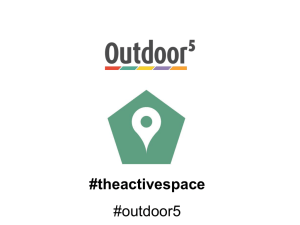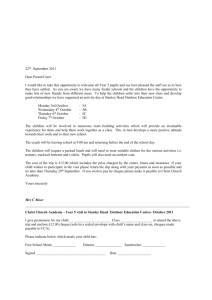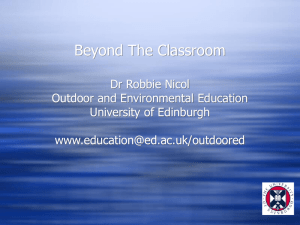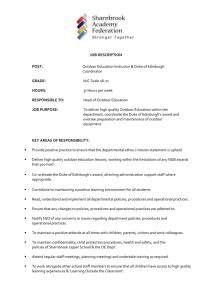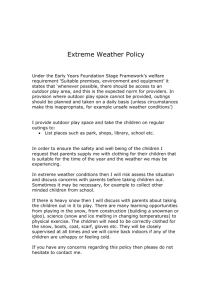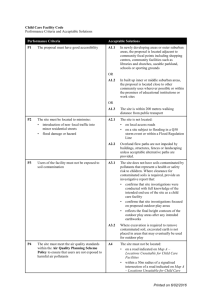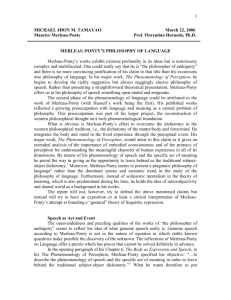Robbie Nicol - Philosophical Perspectives in Outdoor Education
advertisement
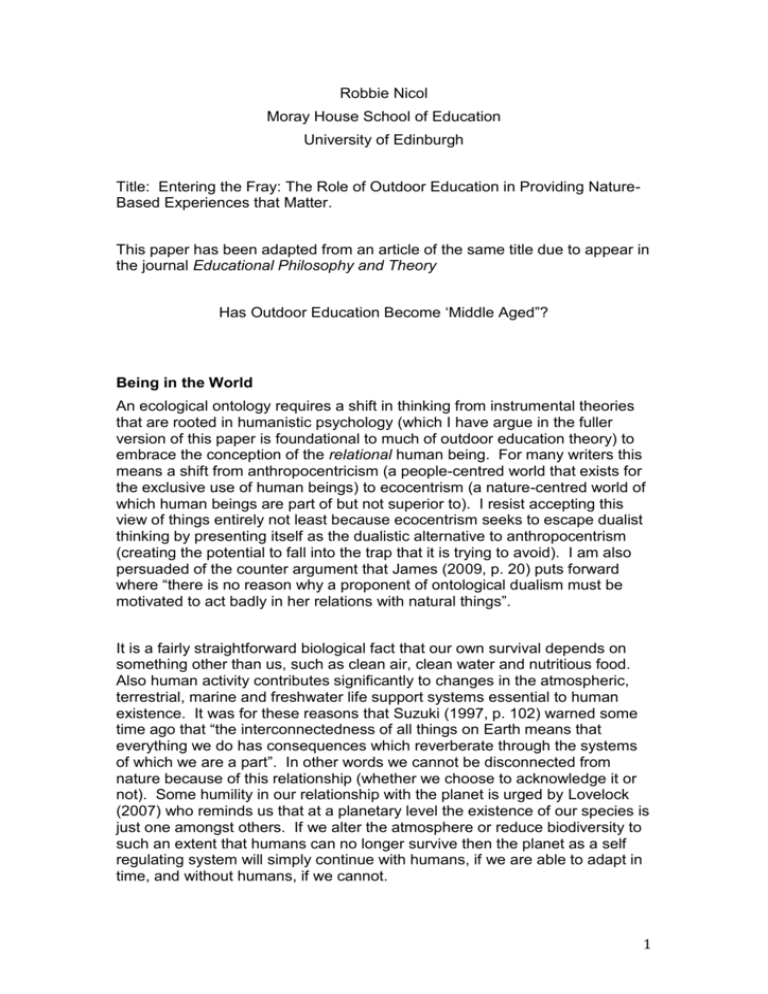
Robbie Nicol Moray House School of Education University of Edinburgh Title: Entering the Fray: The Role of Outdoor Education in Providing NatureBased Experiences that Matter. This paper has been adapted from an article of the same title due to appear in the journal Educational Philosophy and Theory Has Outdoor Education Become ‘Middle Aged”? Being in the World An ecological ontology requires a shift in thinking from instrumental theories that are rooted in humanistic psychology (which I have argue in the fuller version of this paper is foundational to much of outdoor education theory) to embrace the conception of the relational human being. For many writers this means a shift from anthropocentricism (a people-centred world that exists for the exclusive use of human beings) to ecocentrism (a nature-centred world of which human beings are part of but not superior to). I resist accepting this view of things entirely not least because ecocentrism seeks to escape dualist thinking by presenting itself as the dualistic alternative to anthropocentrism (creating the potential to fall into the trap that it is trying to avoid). I am also persuaded of the counter argument that James (2009, p. 20) puts forward where “there is no reason why a proponent of ontological dualism must be motivated to act badly in her relations with natural things”. It is a fairly straightforward biological fact that our own survival depends on something other than us, such as clean air, clean water and nutritious food. Also human activity contributes significantly to changes in the atmospheric, terrestrial, marine and freshwater life support systems essential to human existence. It was for these reasons that Suzuki (1997, p. 102) warned some time ago that “the interconnectedness of all things on Earth means that everything we do has consequences which reverberate through the systems of which we are a part”. In other words we cannot be disconnected from nature because of this relationship (whether we choose to acknowledge it or not). Some humility in our relationship with the planet is urged by Lovelock (2007) who reminds us that at a planetary level the existence of our species is just one amongst others. If we alter the atmosphere or reduce biodiversity to such an extent that humans can no longer survive then the planet as a self regulating system will simply continue with humans, if we are able to adapt in time, and without humans, if we cannot. 1 It is clear now why at least some aspects of realism are important to this debate because not all is social constructionism. There is a reality that is entirely independent of our thinking selves. This is key because whilst the concept of interconnectedness is relatively straightforward scientifically, nature could also exist as an ecosystem without human beings, hence Plumwood’s (2002) insistence on the use of the word ‘dependence’ to denote this relationship. In philosophical terms the world is “already there” and has an “inalienable presence” (Merleau-Ponty, 2002, p. vii). At the same time there is room within for people to consider their relational selves because this is a world in which human beings are clearly located. Thus there is potential for learning in the outdoors to focus on the objective aspects of nature that can be understood through scientific and reductionist means but this needs to be considered within the context of the political and socio-economic influences that affect ecological processes. Phenomenology Environmental philosophers and phenomenologists have something in common – both have set out to redefine what it is to be human. For the former this means the extension of human values to include other-thanhuman. For the latter the notion of embodiment offers an alternative to the view that the human subject is the dualistic opposite of the perceived object. Importantly the relational self in both cases points to a view of the human not simply as ‘how things are’ but ‘how things might be’ in the world. In other words common to both is the recognition of human potential and within that the ability to change. With this recognition Merleau-Ponty (2002, p. viii) says, “we will find in ourselves, and nowhere else, the unity and true meaning of phenomenology”. Thus ontological thinking in environmental philosophy promotes a widening of human interest to include other-than-human whilst phenomenology treats reality not only as an object but also as experiences. Another reason why phenomenology is important to sustainability and the potential development of outdoor education is found in Peters (2009, p. 1) statement that it “studies the structure of consciousness as it is experienced from the first person perspective, focusing on the central characteristic of intentionality.” The statement is important because it provides the opportunity to understand the physical world not only as an abstract entity through book learning but through direct first hand experience of it. This suggests not simply thinking about nature intellectually (although this is important) but to engage in bodily thinking that seeks to bring together, mind and world, structure and agency specific to the individual, group and social sphere of influence. One further aspect to note is that of ‘intentionality’. It is important because it helps transcend the notion of the world simply as ‘already there’ and 2 ‘inalienable’. In relation to sustainability the world may well be ‘already there’ and understood through propositional knowledge. For example, understanding photosynthesis helps explain the way in which carbon moves between spheres (atmosphere, biosphere, hydrosphere, lithosphere) and how human activity is interfering with its natural flow. Thus propositional knowledge is necessary to understand important aspects of the relationship between humans and the planet we inhabit. However intentionality also helps us understand the limitations of such knowledge in terms of sustainability. Merleau-Ponty (2002, p. xx) is quite precise about this when he says that it is for civilizations to discover the world not just by objective thought but also by way of “that formula which sums up some unique manner of behaviour towards others, towards Nature, time and death…”. It is also Merleau-Ponty (2002, p. xxii) who pointed out that “the chief gain from phenomenology is to have united extreme subjectivism and extreme objectivism in its notion of the world or of rationality. Rationality is precisely proportioned to the experiences in which it is disclosed”. Phenomenology, Experiential Education and the Moral Significance of Nature Nature matters to us. It is essential for our survival as a species and is valuable to us in a range of other ways already described. But in what ways should we value nature if we are to live sustainable lifestyles? Now we have a problem because the honest answer must be ‘we don’t really know’ (at least no complete picture appears to be forthcoming). There is a problem because the IPCC (2007) provides data that explain we are not living sustainably on the planet. Yet the empirical data that identifies the problem in great detail offer no empirical solutions. It is for this reason that the problems of sustainability are quite rightly the domain of the philosopher. Philosophers are used to working with ideas where empirical data is absent or irrelevant. Also in working with first principles philosophy may then at least provide guidance for the pursuit of practice. If we look to experiential education for guidance we find that it has “no clear intrinsic moral value” (Horwood, 1991, p. 23). Capra (1996, pp. 289-290) is very explicit on this point suggesting that whilst the non-human world is something to be experienced, still it has “no language, no consciousness, and no culture; and therefore no justice, nor democracy...We cannot learn anything about those human values from ecosystems”. At the same time experiential education theorists warn of the dangers of imposing moral value. In Freireian terms impositions merely serve to alienate people and not liberate them. Phenomenologists who have worked so hard to understand and present the world in non-dualist terms would also bridle at ethical impositions. Meanwhile environmental philosophers continue in their own attempts to resolve the anthropcentric/ecocentric dualism. It appears therefore that we reach another dualistic stalemate with no guidance about what outdoor education might have to offer. The fear of imposing solutions prevents action and the spectre of relativism threatens to isolate individuals from acting together. The scene would appear to be set for another act of jousting 3 between dualities and this perhaps characterises the current situation stalemate. However, phenomenology offers outdoor education a way out of this impasse for three clear reasons. The first is that its starting point is the lived experience of people’s lives. The second is that it encourages experiential approaches to learning in and about world. The third is that it encourages experimental approaches to living in that world. Outdoor education already prides itself in embracing these three principles (at least theoretically). However to more properly focus on sustainability then a framework of ecological ontology would need to be considered as a standpoint from which these principles could operate. With a suitable standpoint in place then the practice of outdoor education might emanate from something lived, experiential, experimental and rooted in an ecological ontology. If we reverse the post hoc rationalism (explored more fully in the published version of this paper) orientation of outdoor education and return to practical everyday settings we can consider inductively how practice might emerge when guided by theoretical principles. More precisely we might consider how theory and practice might emerge together. The Honour of Practice Unlike most other forms of education outdoor education is ideally placed to deal with the problems brought about by ‘nature deficit disorder’ because quite simply the experiences that learners have are already nature-based. The problem from a sustainability point of view is that the supporting theories together with post hoc attempts to justify existing practice has meant that lived experience has never been considered as fully as it might. One objection to this argument might be the need to retrain outdoor educators, or at least reconceptualise some aspect of their work. However this need not be the case. If outdoor educators are true to the spirit of their radical origins and fully embrace experiential and experimental approaches to learning then because experiences are already nature-based then it is clear that there is indeed somewhere to start from. There is however one key factor that still needs to be considered. It is to do with the nature of practice itself and importantly what it is that learners’ experience as they themselves practice. When learners are outdoors it is common for practice to have some focus. If they are canoeing the teacher 1 will want to improve their skill acquisition so as they can become more technically competent. If they are walking the teacher may point out a flower, bird or glaciated valley. If they are talking the teacher may ask them to think about their team roles. If they are reflecting the teacher may ask them to consider their achievements throughout the day. The teacher continually 1 I have used the word ‘teacher’ here in a generic sense to include anyone responsible for learning and teaching outdoors. In addition to school teachers there are people known as instructors, scout and guide leaders, rangers, mountain and river guides. 4 attempts to point out phenomena and ask the learners to reflect on their experiences. In doing so they draw attention to things. It is here in drawing attention to and reflecting on things that outdoor educators find familiar pedagogical starting point. This familiarity is a major convenience and the simplicity of drawing attention to things is a major strength. It does however require consideration of what it is that the teacher draws the learner’s attention to. This is the final part of the jig-saw. It is at this point finally where we will find the crucial intersection between, phenomenology, nature-based experience, experiential and experimental approaches to learning, ecological ontology and the role of outdoor education. James (2009, p. 109) provides some guidance here pointing out that “natural environments have a distinct value: they disclose themselves as places in which we might develop and exercise the virtue of attention”. In other words the moral significance of our relationship with nature is based on the attention we pay to it. In everyday life our attention is mostly focused on human concerns such as consumer purchases, worrying about work, maintaining relationships and a host of other things. These are our common proximal relations that provide formative experiences as we relate and value that which affects us simply because it is the focus of our attention. This is not to deny the ‘realness’ of these worldly issues that normally occupy our time so much as to acknowledge that when we are in nature there is the opportunity to put nature first. It is then just a matter of finding ways to encourage this focus. For Pulé (2009) this means a shift in ethics from ‘daring’ (characterized by anthropocentric qualities) to ‘caring’ (where rational and affective human experiences are rooted in engagement with nature). James and Pulé offer a way of seeing beyond anthropocentric claims. Here are opportunities to feel and think what it is to be a different person in the world. For this potential to be realized attention needs to be paid to the reality of that being. To do this is to recognize that nature has value. However whilst outdoor education is inherently nature-based, as we have seen it is not necessarily nature-attentive. Having argued that outdoor educators have many of the qualities necessary to begin this work it is tempting to close now with the invitation to outdoor educators to start from where they are standing. For fear of being accused of ‘passing the buck’ (and in any case I am talking to myself as a practitioner as much as to anyone else), perhaps some ideas of what nature-attentiveness might look like are appropriate here recognizing that anything other than a partial discussion is beyond the scope of this paper. Author note to the reader: I go on to explore some of these ideas in the published version of this paper. 5 Entering the Fray The pragmatism of experiential and experimental approaches to learning highlights the potential of linking theory with practice. Through this work individual agency and the potential to act is revealed. By explicitly paying attention to nature a value orientation can be developed that can influence moral action. For this to happen values do not need to be imposed. Instead morality comes from interaction. For Merleau-Ponty (2002, p. xix) this means, “in experiencing the beautiful, for example, I am aware of a harmony between sensation and concept, between myself and others…”; then I would add ‘and with nature’. Here we can see a relational trinity involving self, others and nature where the unification of sensations and concepts might just provide a stimulus for sustainable, or at least different, lifestyle choices. Whilst the theoretical debate is complex and dense the starting point from an outdoor teacher’s perspective is ‘ready-made’ because they are already there in the outdoors poised to pay attention. They do not have to resolve any abstract dualism to start this work. The tension between anthropocentric and ecocentric ways of thinking should not be an excuse for not beginning. The tensions are helpful in that they encourage more thought on the subject but it may be more relevant to reframe dualistic arguments as they can lead to paralysis where people are wary of entering the fray for fear of ‘getting it wrong’. If practice were thought of within a pluralistic framework then this would appear to offer support for a variety of worldviews. It is also more authentic in the recognition that there are no ‘right’ or ‘ideal’ spots to start from because one can only ever start from ‘here’ and not ‘there’. Whilst I have put forward some theoretical ideas that might inform practice it is ultimately from practice that such work will emerge. Notwithstanding the seriousness of the situation, as an educational challenge, this is an exciting prospect. Herein lies the unexplored potential of outdoor education. 6 References Capra, F. (1996) The Web of Life. (London, Harper Collins). Horwood, B. (1991) Tasting the Berries: Deep Ecology and Experiential Education. Journal of Experiential Education, 14 (3): 23-26. IPCC, (2007) Climate Change 2007: Synthesis Report. Contribution of Working Groups I, II and III to the Fourth Assessment Report of the Intergovernmental Panel on Climate Change [Core Writing Team, Pachauri, R. and Reisinger, A. (eds.)]. (IPCC, Geneva, Switzerland). James, S. (2009) The Presence of Nature: A Study in Phenomenological and Environmental Philosophy. (Hampshire, Palgarve, Macmillan). Lovelock, J. (2007) The Revenge of Gaia. (London, Penguin). Merleau-Ponty, M. (2002) Phenomenology of Perception. (Oxon, Routledge & Kegan Paul). Peters, M. (2009) Editorial: Heidegger, Phenomenology, Education. Educational Philosophy and Theory, 41, (1), 1-6. Plumwood, V. (2002) Environmental Culture: The Ecological Crisis of Reason. (London, Routledge). Pulé, P. (2007) Good Green Guys: Towards an Ecomasculnism, in: M. Flood, J. Gardiner, B. Pease & K. Pringle (eds.) International Encyclopaedia of Men and Masculinities. (London: Routledge). Suzuki, D. (1997) The Sacred Balance. (NSW, Australia, Allen and Unwin). 7
